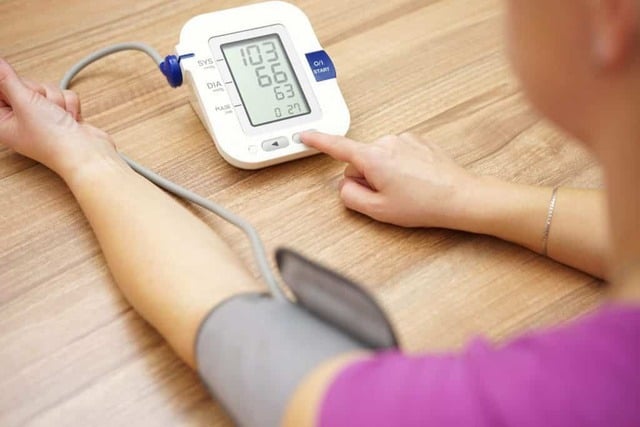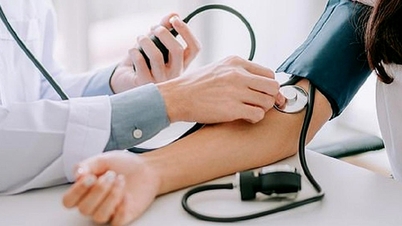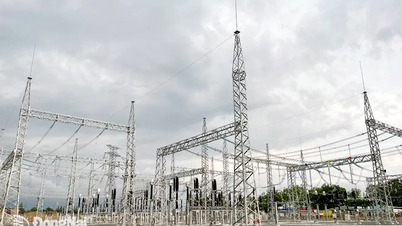Hypertension is one of the common medical conditions in the community today and is increasingly becoming younger. So is blood pressure 160/90 high, how should it be treated?
Hypertension is one of the common medical conditions in the community today and is increasingly becoming younger. So is blood pressure 160/90 high, how should it be treated?
It is estimated that approximately 1.28 billion adults aged 30-79 worldwide have high blood pressure, of which up to 46% of adults with high blood pressure do not know they have the disease.
 |
| Hypertension is one of the most common medical conditions in the community today and is increasingly affecting younger people. |
The American Heart Association (AHA) recommends an ideal blood pressure goal in adults when the systolic blood pressure reading is less than 120 mmHg and the diastolic blood pressure is less than 80 mmHg.
According to the 2017 American College of Cardiology/American Heart Association Guidelines for Prevention, Detection, Evaluation, and Management of High Blood Pressure in Adults, blood pressure levels are as follows:
Blood pressure of 160/90 mmHg is considered high and is stage 2 of hypertension. Normal blood pressure in adults is below 120/80 mmHg.
When blood pressure reaches 160/90 mmHg, it means it has exceeded the safe threshold and can cause many serious health risks. This condition increases the risk of cardiovascular disease, stroke and kidney failure.
People with blood pressure at this level need to be monitored and treated promptly. Depending on the specific condition of each patient, the doctor will give an appropriate treatment regimen including lifestyle changes such as weight loss, salt restriction, increased exercise and may need to take blood pressure lowering medication. Controlling blood pressure at this level is very important to protect overall health and prevent dangerous complications.
According to Master, Doctor, Doctor Nguyen Pham Hoang Long, Cardiovascular Center, Tam Anh General Hospital, Ho Chi Minh City, a blood pressure index of 160/90 mmHg is considered high blood pressure, and the patient is at risk of serious health problems.
Such high blood pressure needs to be monitored and treated by a doctor to reduce the risk of cardiovascular-related complications, such as heart disease, stroke, and damage to other organs.
However, it should be noted that blood pressure index can change naturally due to many different causes, to correctly determine high blood pressure requires examination and diagnosis by a doctor.
If blood pressure rises to 160, treatment is essential to help control and maintain blood pressure at a safe level, reducing the risk of dangerous complications.
Use medication as directed by your doctor. When your blood pressure reaches 160/90, it is extremely important to use medication as directed by your doctor.
The doctor will prescribe appropriate medication based on the patient's specific condition. Some commonly prescribed medications include: ACE inhibitors, beta blockers, calcium channel blockers or diuretics. When prescribed medication to treat high blood pressure, the patient must use the medication according to the instructions regarding dosage and time of taking the medication.
Along with taking medication as prescribed by the doctor, people with high blood pressure should combine it with a scientific lifestyle including: a suitable diet, regular exercise, weight loss if overweight or obese, limit alcohol consumption and stop smoking.
People with high blood pressure should adjust their diet scientifically, can apply the DASH diet (Dietary Approaches to Stop Hypertension) rich in fruits, vegetables, whole grains, low-fat dairy products, increase foods rich in potassium, magnesium and calcium.
At the same time, limit foods rich in saturated fat and cholesterol, reduce salt intake as directed by your doctor. People with high blood pressure should ensure adequate sleep, from 7-9 hours each night to give the body time to recover and regulate blood pressure. You should create a comfortable, quiet and dark sleeping environment to improve sleep quality. Limit the risks of high blood pressure.
To control blood pressure, especially for people with high blood pressure up to 160/90 mmHg, it is necessary to limit risk factors that cause high blood pressure by ways such as: Limiting stress.
Limit your intake of caffeinated beverages such as coffee, alcohol, and beer. Do not smoke. Control other chronic diseases such as diabetes or kidney disease. Visit your doctor regularly as directed.
Regular health check-ups as directed by your doctor are very important, especially for people diagnosed with high blood pressure. In addition, patients should proactively measure their blood pressure at home and record the results to report to their doctor during follow-up visits.
If any unwanted side effects occur during treatment, the patient should immediately notify the doctor for examination and medication adjustment if necessary.
People with blood pressure of 160/90 should measure their blood pressure at least twice a day, usually in the morning and evening. Each measurement should be taken 2-3 times, about 1-2 minutes apart, and the average value taken. This regular measurement helps monitor changes in blood pressure and evaluate the effectiveness of treatment.
High blood pressure is one of the leading causes of dangerous complications such as heart attack, stroke and heart failure. People with blood pressure levels of 160/90 are at risk of health problems such as:
Cardiovascular disease: High blood pressure of 160/90 mmHg significantly increases the risk of serious cardiovascular disease. Continuous high pressure on the blood vessel walls can lead to plaque buildup, narrowing the coronary arteries that supply blood to the heart. This can cause angina, heart attack, and in severe cases, heart failure.
Stroke: High blood pressure can weaken or rupture blood vessels in the brain, leading to a stroke. It can also cause blockages in the arteries of the brain, leading to ischemia. The consequences of a stroke can be severe, ranging from paralysis to loss of speech, vision loss, or death.
Kidney failure: Patients with long-term hypertension that is not properly treated can lead to kidney failure at various levels, the most serious of which is progression to end-stage chronic kidney failure, and the patient may need a kidney transplant or regular renal replacement therapy.
Eye damage: High blood pressure can damage blood vessels in the retina, leading to hypertensive retinopathy. This condition can cause retinal hemorrhage, retinal edema, and, in severe cases, blindness.
Atherosclerosis: High blood pressure is one of the factors that promote the process of atherosclerosis, damaging the inner lining of the arteries, creating conditions for cholesterol and other fats to accumulate in the vessel wall. When this happens, the lumen of the vessel becomes narrowed and blocked, reducing blood flow to vital organs, increasing the risk of angina, claudication and other cardiovascular complications.
Cognitive decline: Research shows that people with uncontrolled high blood pressure have a higher risk of developing dementia and Alzheimer's disease than people with normal blood pressure.
Peripheral artery disease: Atherosclerosis causes narrowing or blockage of small blood vessels in the legs, causing pain, numbness, and muscle weakness when walking or exercising. In severe cases, it can lead to tissue necrosis and amputation.
Erectile dysfunction: Men who smoke, have diabetes or high blood pressure are at risk of erectile dysfunction.
Source: https://baodautu.vn/huyet-ap-o-muc-16090-co-nguy-hiem-d229117.html

























































![[Maritime News] Wan Hai Lines invests $150 million to buy 48,000 containers](https://vphoto.vietnam.vn/thumb/402x226/vietnam/resource/IMAGE/2025/6/20/c945a62aff624b4bb5c25e67e9bcc1cb)














![[Infographic] Party Committee of the Ministry of Culture, Sports and Tourism: Marks of the 2020 - 2025 term](https://vphoto.vietnam.vn/thumb/402x226/vietnam/resource/IMAGE/2025/6/22/058c9f95a9a54fcab13153cddc34435e)
























Comment (0)